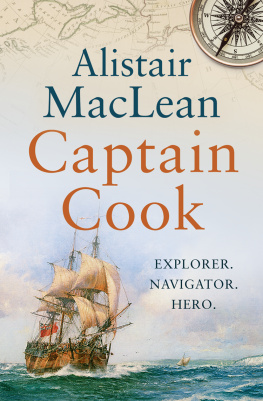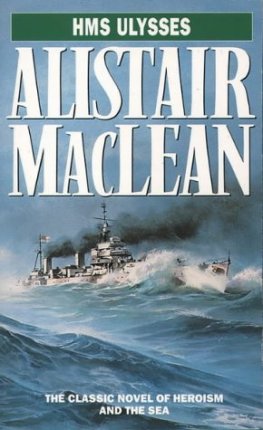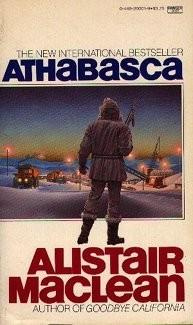Alistair MacLean - Captain Cook
Here you can read online Alistair MacLean - Captain Cook full text of the book (entire story) in english for free. Download pdf and epub, get meaning, cover and reviews about this ebook. year: 2019, publisher: HarperCollins Publishers, genre: Non-fiction / History. Description of the work, (preface) as well as reviews are available. Best literature library LitArk.com created for fans of good reading and offers a wide selection of genres:
Romance novel
Science fiction
Adventure
Detective
Science
History
Home and family
Prose
Art
Politics
Computer
Non-fiction
Religion
Business
Children
Humor
Choose a favorite category and find really read worthwhile books. Enjoy immersion in the world of imagination, feel the emotions of the characters or learn something new for yourself, make an fascinating discovery.
- Book:Captain Cook
- Author:
- Publisher:HarperCollins Publishers
- Genre:
- Year:2019
- Rating:3 / 5
- Favourites:Add to favourites
- Your mark:
- 60
- 1
- 2
- 3
- 4
- 5
Captain Cook: summary, description and annotation
We offer to read an annotation, description, summary or preface (depends on what the author of the book "Captain Cook" wrote himself). If you haven't found the necessary information about the book — write in the comments, we will try to find it.
Captain Cook — read online for free the complete book (whole text) full work
Below is the text of the book, divided by pages. System saving the place of the last page read, allows you to conveniently read the book "Captain Cook" online for free, without having to search again every time where you left off. Put a bookmark, and you can go to the page where you finished reading at any time.
Font size:
Interval:
Bookmark:


1 London Bridge Street
London SE1 9GF
www.harpercollins.co.uk
This eBook edition published 2020
First published in Great Britain by Collins 1972
Copyright HarperCollinsPublishers 1972
Alistair MacLean asserts the moral right to be identified as the author of this work
Cover design HarperCollinsPublishers Ltd 2020
Images: Triumph of the Navigators by Robin Brooks / Bridgeman Images (front cover), Granger / Bridgeman Images (map), Shutterstock.com (compasses)
A catalogue record for this book is available from the British Library
All rights reserved under International and Pan-American Copyright Conventions. By payment of the required fees, you have been granted the non-exclusive, non-transferable right to access and read the text of this e-book on screen. No part of this text may be reproduced, transmitted, down-loaded, decompiled, reverse engineered, or stored in or introduced into any information storage and retrieval system, in any form or by any means, whether electronic or mechanical, now known or hereinafter invented, without the express written permission of HarperCollins.
Source ISBN: 9780007371983
Ebook Edition February 2020 ISBN: 9780008353346
Version: 2020-01-22
CONTENTS

Shortly after the turn of the nineteenth century, a young gunner in the Royal Navy, a certain Jeremy Blyth, who had yet to sail on his first commission, made his way into an alehouse in Wapping. It was a dock-side tavern typical of its time and place, dirty, smoky, with cracked floor-boards and blackened walls and ceiling, entirely lacking in what, even in that era, passed for the more civilised amenities of life. A planked bar, a few rickety tables and chairs; that was all. Typical, too, were the customers: a mixture of seamen from both naval services, many the victims of press-gangs, many with criminal pasts, hard-drinking, hard-swearing, hard-living men inured to suffering and hardships and death, men tough and enduring and hard-bitten to a degree almost incomprehensible to those who live in a gentler and more effete age.
Atypical, however, was the atmosphere in that ale-house. No one spoke. No one drank. The silence was accentuated by occasional sobs. The landlord, shoulders heaving, had his head buried in his forearms. So did a number of those at the tables. Some of the men were openly weeping and all seemed lost in their own private worlds of grief-stricken desolation. Blyth sat down opposite a grizzled old seaman, a grey-cheeked veteran with tears welling from sightless eyes, an untouched drink before him. Wonderingly, gently, Blyth touched him on the forearm.
What is it? Whats wrong?
The old man looked up from the table and said angrily Havent you heard? Havent you heard?
Blyth shook his head.
Nelson is dead.
Again Blyth looked slowly round the dingy room, at the men for whom the death of Nelson had left an aching void that could never be filled, then he said: Thank God I never knew him.
It is doubtful whether any such scene occurred, or any remotely comparable, when the news of Cooks death reached England some twenty-six years earlier. The nation mourned him, as England has always mourned the passing of its great men, its Marlboroughs, its Wellingtons, its Churchills: but it did not weep with a broken heart.
Nelson and Cook are the two most revered names in the annals of the Royal Navy. Reverence is compounded of respect and love. Nelson was widely respected but universally loved. Cook was universally respected but he was incapable of inspiring in the minds and hearts of the public that degree of devotion and adoration that Nelson so effortlessly and inevitably aroused. But that Cook was beloved by his officers and men is beyond dispute.
The reason for the difference lies, of course, in the natures of the two men. To love a person, a public figure, one has to be able to identify ones self with him: to do that, one has to know him or, at least, believe that one knows him. In so far as this was concerned, there was no difficulty at all about Nelson, a warm-hearted, outgoing extrovert whose inner thoughts and private life were as open a book as his public ones. But Cooks inner thoughts and private life were a closed book, one of those old-fashioned books with a brass hasp that hed locked and then thrown away the key. With the passing of the years it seems increasingly unlikely that the key will ever be found.
We know all about Cook and we know nothing about him. We know that he was courageous, prudent, wise, indefatigable, adventurous, a born leader of men: but what he was like, what kind of individual he was personally, we have but the most remote of conceptions. We know that he took those leaking old coal-boats of his from the tropical Pacific to the bitter and awesome wastes of both the Arctic and the Antarctic in the most stupendous voyages of exploration in the history of mankind. But whether he liked flowers or dandled his children on his knee or gazed enraptured at the sun going down in the ocean beyond Hawaii or Tahiti we shall never know. We know he was the greatest navigator of his age or any age: it would be interesting to know if he ever got lost in the back streets of his home borough of Stepney.
To have maintained so inviolate a privacy is indeed a feat, but to have done so in spite of the fact that he left us over one million words minutely recording his day to day activities over many years amounts to an accomplishment so staggering as to defy rational comprehension. But, in his journals and logs, this is what Cook did indeed do. No famous figure of modern times has ever documented his life so thoroughly and painstakingly. But this massive documentation is detached, impersonal; Cook does not appear: it was about what he did, not what he was. Even in his private correspondence what little of it has survived this same iron reticence manifests itself. Only twice does he mention his wife and then only in an incidental fashion: of his two children who died in infancy or his daughter who died at the age of four, there is no authenticated instance of Cook ever having mentioned them.
His contemporaries wrote of him of course, from Walpole to Dr Johnson they all had their say, and when all their writing is over and done with we learn no more about Cook than we learn from Cook himself. Maybe they did not know him as they would have liked to know him: maybe he was reserved to the point of being unapproachable. It may even have been that they were aware that they were dealing with an already living legend who was destined for immortality. If this were the case then their task was impossible: the myth envelops the man, so cocooning its creator in the folds of his fame that it becomes virtually certain that not even the keenest eye can penetrate to the heart of the legend, a legend that will accept only the most grandiose rhetoric, the most broad and sweeping generalisations: one does not customarily discuss an immortals taste in cravats or whether he stopped to smell the lilac on an evening late in May.
Biographies of Cook there have been, of course, many of them. But none of them is the good and true and definitive biography of a man about whom we should like to know so much. It is very much to be doubted whether there will ever be such a biography. Most of the biographers who have tried to flesh out the skeleton of his awesome reputation have had to have recourse to varying degrees of invention or imagination while honestly trying to remain within the bounds of probability. Thus, we are told on one occasion that Mrs Cook welcomed her husband home with tearful affection after one of his marathon voyages, affection because he had been so long away, tearful because one of their children had died in his absence. Now, this is very likely: but there is nothing on record to justify such an assertion. She may, for all we know, have hit him over the head with a two-by-four. This, admittedly, is extremely unlikely. The point is that, in the absence of evidence to the contrary, it is not impossible. Extrapolation and uninspired guesses are no substitute for historical accuracy.
Font size:
Interval:
Bookmark:
Similar books «Captain Cook»
Look at similar books to Captain Cook. We have selected literature similar in name and meaning in the hope of providing readers with more options to find new, interesting, not yet read works.
Discussion, reviews of the book Captain Cook and just readers' own opinions. Leave your comments, write what you think about the work, its meaning or the main characters. Specify what exactly you liked and what you didn't like, and why you think so.











